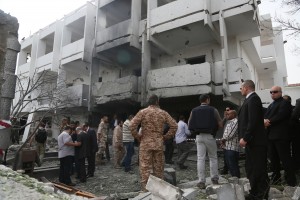French embassy in Tripoli bombed, 2 injured

Security officers and officials inspect the site of a car bomb that targeted the French embassy wounding two French guards and causing extensive material damage in Tripoli, Libya, Tuesday, April 23, 2013. AP PHOTO/ABDUL MAJEED FORJANI
TRIPOLI—A car bomb hit France’s embassy in Libya on Tuesday, wounding two French guards and causing extensive damage in the first attack on a foreign mission since militants stormed the US consulate in Benghazi in September.
Libyan Foreign Minister Mohammed Abdel Aziz branded the bombing a “terrorist act,” and French President Francois Hollande said Tripoli must act quickly to find the perpetrators and bring them to justice.
The attack comes as Libya is plagued by a lack of security following the 2011 ouster of long-time dictator Muammar Gaddafi and as French forces are engaged in a battle against Islamist extremists in Mali, another North African country.
The blast occurred around 7:10 a.m. (0510 GMT), Tripoli security chief Mahmud al-Sherif said, after an explosives-laden car was parked outside the mission’s front door.
Sherif said “this was not a suicide bombing,” adding that “we face several threats and enemies, and it is too early to point to any party in particular.”
Article continues after this advertisementAn AFP correspondent said the wall surrounding the property was destroyed and the embassy building extensively damaged, with one French employee saying “there’s nothing left of my office.”
Article continues after this advertisementThe explosion, which created a deep crater on the street, destroyed two cars parked nearby, damaged two neighboring villas and blew out the windows of a shop 200 metres (yards) away.
A French source said one guard was seriously wounded and another lightly hurt in the attack on the mission, housed in a two-story villa in the upmarket Gargaresh area.
Interior Minister Ashur Shwayel said one of the guards had injuries to his back and head and was in stable condition after undergoing surgery.
Libyan state news agency Lana added that a girl living in the neighborhood was also hurt.
Jamal Omar, who lives across the street and whose face was slightly injured, said the car must have been parked only minutes before the explosion.
“I was sweeping outside my house, and there wasn’t any car in front of the embassy. The explosion happened less than five minutes after I went back inside.”
France condemned the “odious” attack.
“In liaison with the Libyan authorities, the services of the state will do everything to establish the circumstances of this odious act and rapidly identify the perpetrators,” Foreign Minister Laurent Fabius said in a statement.
“This attack could have been absolute carnage. It was a matter of minutes: if the staff had been there this would have been a terrible tragedy,” Fabius told BFM Television.
“This attack was meant to kill. France will not surrender,” he said. “This attack targeted not only France but all of the countries who are fighting against terrorist groups.”
Fabius arrived Tuesday afternoon in Libya where he was due to visit the scene of the attack and then hold a news conference with Libya’s National Assembly chief Mohammed al-Megaryef, officials said.
Hollande said in a statement that “France expects the Libyan authorities to ensure that all possible light is shed on this unacceptable act so that the perpetrators are identified and brought to justice.”
The anti-terrorism branch of the Paris prosecutors’ office has opened an investigation into the attack. The gendarmerie is sending 10 officers to the scene to boost security and to study the possibility of moving the embassy.
Libya’s foreign minister declined to speculate on who carried out the attack or what the motive was.
“We strongly condemn this act, which we regard as a terrorist act against a brother nation that supported Libya during the revolution” that ousted Gaddafi, Abdel Aziz told AFP at the scene.
“We regret this act and express our solidarity with the French government and people,” he added, announcing that a joint commission had been formed to investigate the attack.
In particular, Shwayel said there were questions about where the embassy’s Libyan guards were when the bomb exploded, as they should have been outside on the street.
The French primary and high schools, both located in the same neighborhood as the embassy, closed on Tuesday for an indefinite time, parents said.
Shwayel said security had been stepped up around French interests in Libya, as well as at embassies of other countries.
France, under then president Nicolas Sarkozy, led NATO air raids against Kadhafi’s forces under a UN resolution aimed at protecting civilians.
Since Gaddafi’s fall, Libya has been hit by persistent insecurity, especially in the region of Benghazi, which has been hit by bombings and assassinations that have forced many Westerners to leave the eastern city.
Four Americans, including ambassador Chris Stevens, were killed when heavily armed men overran the Benghazi mission on September 11, setting fire to much of the compound and then attacking a nearby annex.
The violence in Libya is often blamed on radical Islamists persecuted under Gaddafi who now want to settle old scores, while security remains the prerogative of militias in a number of important areas.
Armed jihadist groups hurt by the French intervention in northern Mali had threatened retaliation by attacking French interests across the world.—Imed Lamloum